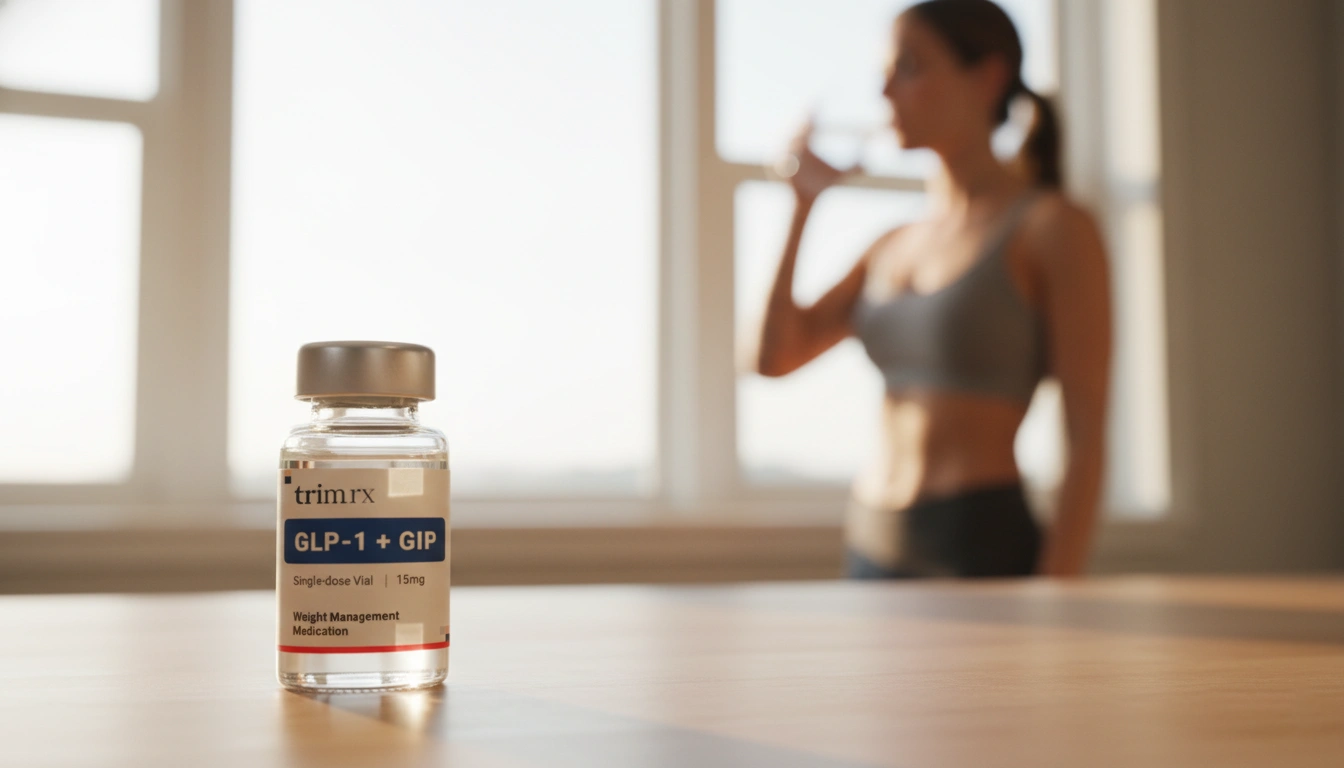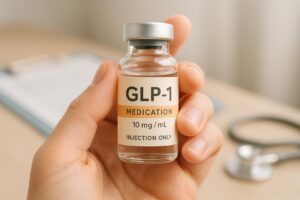Are GLP-1 Supplements Safe? A Closer Look at Natural Alternatives

Introduction
Have you ever wondered about the safety and efficacy of GLP-1 supplements, often touted as “nature’s Ozempic”? As the buzz around weight loss solutions grows, many are exploring these supplements as alternatives to prescription medications. Recent statistics show that prescription GLP-1 medications like Ozempic and Wegovy have garnered immense popularity, particularly in the realm of weight management and diabetes treatment. However, with the rise of GLP-1 supplements claiming to offer similar benefits, it’s essential to discern fact from fiction regarding their safety and effectiveness.
In this blog post, we will delve into the world of GLP-1 supplements, exploring what they are, how they differ from prescription medications, and whether they are a safe option for those looking to manage their weight. We’ll examine the claims made by supplement manufacturers, the current scientific understanding of GLP-1, and the implications for individuals considering these products. By the end of this post, you’ll have a clearer understanding of whether GLP-1 supplements are a viable and safe choice for your weight loss journey.
Our exploration will include:
- An overview of GLP-1 and its role in weight management
- A detailed analysis of GLP-1 supplements and their ingredients
- Insights from medical professionals regarding their safety and efficacy
- Recommendations for safe practices in weight loss and health management
As we navigate these important topics, we hope to empower you with knowledge and foster a better understanding of how to approach weight loss safely and effectively.
Understanding GLP-1: The Basics
GLP-1, or glucagon-like peptide-1, is a hormone produced in the gut that plays a vital role in appetite regulation and glucose metabolism. Released in response to food intake, GLP-1 enhances insulin secretion, suppresses glucagon release, and reduces gastric emptying, leading to a feeling of fullness. This intricate mechanism makes GLP-1 a critical target for weight management therapies.
Prescription medications such as Ozempic (semaglutide) and Wegovy have been developed to mimic the effects of GLP-1, providing a regulated and effective means of managing weight and blood sugar levels. These medications have undergone extensive clinical trials, demonstrating significant efficacy in promoting weight loss and improving metabolic health.
The Rise of GLP-1 Supplements
With the increasing demand for weight loss solutions and the high costs associated with prescription medications, many individuals are turning to GLP-1 supplements as a more accessible option. Marketed as natural alternatives that can boost the body’s production of GLP-1, these supplements often include ingredients like berberine, saffron extract, and various fruit extracts.
However, the supplement industry is notoriously less regulated than pharmaceuticals, raising concerns about the safety and effectiveness of these products. Unlike prescription medications, dietary supplements do not require rigorous clinical trials or FDA approval before they hit the market. This lack of oversight can lead to inconsistencies in product quality and potency, making it essential for consumers to approach these supplements with caution.
How Do GLP-1 Supplements Work?
GLP-1 supplements claim to stimulate the body’s natural production of the GLP-1 hormone, thereby aiding in appetite suppression and weight management. However, it’s crucial to understand how these supplements differ from their pharmaceutical counterparts.
Ingredients Commonly Found in GLP-1 Supplements
-
Berberine: Often touted as a natural alternative to GLP-1 medications, berberine has been shown to have some effects on glucose metabolism. However, studies indicate that its impact on weight loss is modest at best, with results varying widely among individuals.
-
Saffron Extract: Some studies suggest that saffron may help reduce appetite and improve mood, which can indirectly support weight loss efforts. However, the evidence remains limited, and more research is needed to validate these claims.
-
Fruit Extracts: Ingredients like Morosil (red orange extract) and Eriomin (lemon fruit extract) are frequently included in GLP-1 supplements, with claims that they can enhance GLP-1 levels. Yet, clinical evidence supporting their effectiveness is sparse and often derived from small studies.
-
Fiber: Many GLP-1 supplements include fiber, which is known to aid in satiety. While fiber is an essential component of a healthy diet, obtaining it through whole foods is generally more effective than relying on supplements.
The Difference Between Supplements and Medications
While GLP-1 medications like Ozempic and Wegovy provide a direct, potent effect by mimicking GLP-1, supplements lack this level of efficacy. The hormones in medications are standardized in dosage and effect, ensuring consistent results across different patients. In contrast, supplements can vary greatly in potency, purity, and effectiveness.
Moreover, prescription medications undergo extensive clinical testing to ensure their safety and efficacy. In contrast, the supplement market lacks such rigorous standards, making it challenging for consumers to assess the reliability of a product.
Expert Opinions on the Safety of GLP-1 Supplements
To gain a clearer perspective on the safety of GLP-1 supplements, we consulted healthcare professionals in the fields of obesity medicine and nutrition.
Key Insights from Medical Professionals
-
Regulatory Concerns: Experts emphasize the lack of FDA regulation in the supplement industry, which creates uncertainty regarding the safety and efficacy of GLP-1 supplements. Dr. Beverly Tchang, an obesity medicine specialist, warns that without proper oversight, individuals may unknowingly consume products that could lead to adverse health effects.
-
Potential Interactions: For individuals taking prescription medications, particularly those for diabetes, the risk of interactions with supplements is a significant concern. Some ingredients in GLP-1 supplements might lower blood sugar levels excessively, leading to hypoglycemia—a potentially dangerous condition.
-
Limited Evidence of Effectiveness: Many healthcare professionals remain skeptical about the claims made by GLP-1 supplement manufacturers. Dr. Donna Ryan, an obesity medicine specialist, points out that while some ingredients may have preliminary evidence supporting their role in weight management, they do not come close to the robust data backing prescription GLP-1 medications.
-
Focus on Lifestyle Changes: Healthcare providers often recommend focusing on established methods for weight management, such as a balanced diet, regular exercise, and adequate sleep. These strategies are proven to promote long-term health and can naturally enhance the body’s production of GLP-1 without the need for supplements.
Recommendations for Safe Weight Management
At TrimRx, we believe in a holistic and personalized approach to weight loss, emphasizing safe and sustainable practices. Here are some recommendations for individuals considering weight loss strategies:
1. Consult with Healthcare Professionals
Before starting any new supplement or weight loss program, it’s essential to consult with a healthcare provider. They can provide personalized advice based on your medical history and current medications.
2. Focus on Whole Foods
Incorporating whole, nutrient-dense foods into your diet can naturally boost GLP-1 levels and promote satiety. Foods rich in protein, healthy fats, and fiber—like fruits, vegetables, whole grains, and lean meats—are excellent choices for weight management.
3. Regular Physical Activity
Engaging in regular exercise not only supports weight loss but also enhances metabolic health. Aim for at least 150 minutes of moderate-intensity exercise per week, combined with strength training to build muscle and promote fat loss.
4. Monitor Your Progress
Tracking your food intake, exercise, and weight can help you stay accountable and identify patterns that may affect your weight loss journey. Consider working with a healthcare provider or a nutritionist for additional support.
Conclusion
As we’ve explored, while GLP-1 supplements may seem appealing as a natural alternative to prescription medications, their safety and efficacy remain questionable. The lack of regulation in the supplement industry poses significant risks, and individuals should approach these products with caution. It’s essential to prioritize proven weight management strategies, such as consulting healthcare professionals, focusing on a balanced diet, and engaging in regular physical activity.
At TrimRx, we are committed to providing personalized weight loss solutions that prioritize safety and effectiveness. If you’re considering prescription GLP-1 medications, we encourage you to take our free assessment quiz to see if you qualify for our personalized weight loss programs. With our comprehensive approach, including doctor consultations, medications, and ongoing support, we strive to help you achieve your health goals safely and sustainably.
FAQ
Are GLP-1 supplements safe to take?
While some ingredients in GLP-1 supplements may be safe for most individuals, the lack of regulation and rigorous testing raises concerns about their overall safety and efficacy. Always consult with a healthcare provider before starting any supplement.
How do GLP-1 medications differ from supplements?
GLP-1 medications are FDA-approved drugs that mimic the effects of the GLP-1 hormone and have undergone extensive clinical trials. In contrast, supplements may lack the same level of potency, regulation, and evidence supporting their effectiveness.
Can GLP-1 supplements help with weight loss?
While some supplements claim to boost GLP-1 levels and aid in weight loss, the evidence supporting their efficacy is limited. Individuals are encouraged to focus on proven weight management strategies, such as a healthy diet and exercise.
What should I do if I’m considering GLP-1 supplements?
Consult with a healthcare provider before trying any new supplement. They can help determine the best approach for your weight loss journey and ensure that it aligns with your overall health goals.
How can I naturally boost my GLP-1 levels?
Focusing on a balanced diet rich in protein, healthy fats, and fiber, along with regular physical activity, can naturally enhance GLP-1 production and support weight management.

Transforming Lives, One Step at a Time
Keep reading
GLP-1 Medication Side Effect Checker
Worried about GLP-1 medication side effects? Use our free checker for Semaglutide, Liraglutide, and more to learn what to expect and stay informed!
GLP-1 Dose Titration: Research Insights
Gradual GLP-1 dose increases balance weight loss and GI side effects; personalized titration and monitoring improve real-world outcomes.
Wave Life Sciences unveils Phase I results for obesity treatment
Wave Life Sciences’ single-dose RNA therapy showed 4% total body fat reduction and promising Phase I results.



